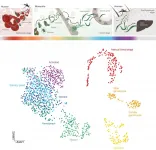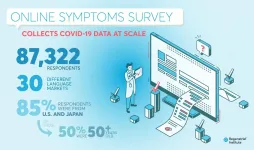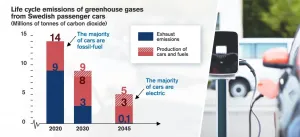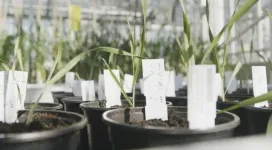(Press-News.org) PULLMAN, Wash. - For decades, wealthy nations have transported plastic trash, and the environmental problems that go with it, to poorer countries, but researchers have found a potential bright side to this seemingly unequal trade: plastic waste may provide an economic boon for the lower-income countries.
In a study published in the Journal of World Systems Research, Yikang Bai of Washington State University and Jennifer Givens of Utah State University analyzed 11 years of data on the global plastics trade against economic measures for 85 countries. They found that the import of plastic waste was associated with growth in gross domestic product per capita in the lower-income countries.
"Our study offers a nuanced understanding of the global trade in plastic waste," said Bai, a recent WSU Ph.D. graduate and lead author on the study. "Media coverage often has a narrative that developed countries shift environmental harms to less developed countries. There's another layer of the story: plastic waste could be used as a resource first, even though ultimately it could still add to the environmental burdens of less-developed countries."
The authors emphasized that plastic waste is still a big problem, especially for developing countries, as most does not get recycled and even plastics that are recycled still ultimately end up negatively affecting the environment. This study only indicates that some plastic waste is being purchased and repurposed before being thrown away.
For the study, Bai and Givens analyzed data from the United Nations and the World Bank looking at several economic variables as well as trade information on common plastic wastes such as polyethylene and polystyrene, also known as #1 and #2 plastics respectively. They analyzed data on 45 high-income countries mostly found in the Global North, including European countries and the United States - and 40 lower income countries which are mostly found in the Global South such as Botswana, El Salvador and Vietnam.
The data ranged from 2003 to 2013, allowing the researchers to conduct a longitudinal analysis--showing change over time--which can reveal a strong connection among the measures. While they found an association between economic benefits and plastic waste imports in the lower income countries, for the high-income countries there was no association between importing waste and economic growth.
While the study did not assess exactly how the plastic waste was being used in the developing countries, the authors note that it is likely they are recycling some of the plastic for use in industry and manufacturing. There was also some evidence that the lower-income countries were trading the plastic waste among themselves regionally.
"Most plastic doesn't get recycled - that's important to keep in mind," said Givens, a USU assistant professor of sociology. "A lot of plastic waste ends up in landfills or in the environment, so maybe it's a silver-lining that importing plastic waste is associated with economic development in developing countries. At least they are recycling some of it and not using virgin materials because plastics are made from fossil fuel chemicals."
The researchers emphasized that there is a lot of complexity in global trading of plastic waste. In the future, they plan to investigate the regional trade among countries as well as changes in more recent years, especially in light of the fact that China stopped taking plastic waste imports in 2018.
Even with the economic benefits of importing plastic waste, reducing environmental harm from plastics would still likely require changes from both high-income countries and lower-income countries, especially high-income countries, said Bai.
"Some people might argue that developed countries need to create more ways to better process plastic waste domestically, instead of looking for other destinations for plastic waste overseas," he said. "The way we recycle plastic waste varies greatly across the United States. Some communities may do it well, but in others, there is still room for improvement. Producing and using less plastic would be another way to reduce environmental harms."
INFORMATION:
DALLAS, May 27, 2021 -- Adults who have obsessive-compulsive disorder (OCD) were more than three times as likely to have an ischemic stroke later in life compared to adults who do not have OCD, according to new research published today in Stroke, a journal of the American Stroke Association, a division of the American Heart Association.
"The results of our study should encourage people with OCD to maintain a healthy lifestyle, such as quitting or not smoking, getting regular physical activity and managing a healthy weight to avoid stroke-related risk factors," said study senior author Ya-Mei Bai, M.D., Ph.D., a professor in the department of psychiatry at Taipei Veterans General Hospital ...
Researchers have mapped in fine detail the genetic changes malaria parasites go through as they prepare to infect people.
The atlas maps the malaria parasite Plasmodium falciparum in unprecedented cellular detail as it develops inside a mosquito and prepares to infect humans through a bite. This detailed investigation could lead to new ways to block key stages in the parasite's development and prevent transmission through future drugs or vaccines.
Mosquitoes are increasingly resistant to pesticides, and the parasite that causes malaria is also becoming increasingly ...
A cutting-edge digital tool that will make it cheaper, safer and faster for pharmaceutical companies to predict protein stability - a vital step in the development of new medicines - is being rolled out by scientists from the UK's University of Bath through their spin-out company, BLOC Labs.
The tool, launched this week, will help researchers identify the most promising protein molecules for drug development. It has the potential to play an important role in the creation of monoclonal antibodies (mAbs). The market for these therapeutic antibodies is worth over £70 bn.
Monoclonal antibodies are a type of protein derived from natural antibodies and then refined and mass produced in the lab. They are steadily transforming the way we treat and prevent diseases, from ...
Nearly three years after the Trump administration's "Zero Tolerance" policy went into effect, more than 445 children remain separated from their families, largely due to insufficient identifying paperwork and U.S. immigration officials' failures to plan, track and reunite separated families. In a Policy Forum, Elizabeth Barnert and colleagues - an interdisciplinary group of physicians, scientists and human rights advocates - argue that a well-defined, replicable, scalable, and sustainable framework to collect and manage sensitive DNA data is urgently needed in order to play a part in helping reunite separated migrant families safely and ethically. ...
Research across a wide range of languages shows that children's home literacy environment can often predict their language and literacy skills. However few studies, especially for English speaking children, examine how children's development affects what parents do and not just how parents affect their children's development. A new longitudinal study examined such bidirectional relationships between home literacy environment and children's progress in learning to read between grades 1 and 3. Results show that parents adjust their reading activities with their children over time, taking into account the level of difficulty the children are having in learning to ...
Research shows that poor sleep health may disproportionately affect children of color from families of low socioeconomic status and place them at risk for behavior problems and lower academic performance. However, few sleep studies utilize standard measures of both classroom behavior and academic achievement.
A new longitudinal study examined the relation between sleep, classroom behavior, and academic achievement scores among primarily Black children growing up in historically disinvested neighborhoods. Disinvested refers to neighborhoods in which public and private funding, city services, or other necessary resources have been denied or withheld, and which are often segregated ...
INDIANAPOLIS -- A pilot project using an online survey to gather data on COVID-19 symptoms received more than 87,000 responses from around the world, providing important insight into the spread of disease. Project leaders from Regenstrief Institute, Indiana University and Microsoft believe these questionnaires could be a valuable tool for population health.
The 7-question survey was launched in multiple languages during April 2020, as lockdowns were implemented to slow the spread of COVID-19. A link to the survey was placed in banner ads in Microsoft News articles. Respondents ...
If a ban were introduced on the sale of new petrol and diesel cars, and they were replaced by electric cars, the result would be a great reduction in carbon dioxide emissions. That is the finding of new research from Chalmers University of Technology, Sweden, looking at emissions from the entire life cycle - from manufacture of electric cars and batteries, to electricity used for operation. However, the total effect of a phasing out of fossil-fuelled cars will not be felt until the middle of the century - and how the batteries are manufactured will affect ...
Urgent investment in new tools is needed to address major global losses of wheat crops which cost £22 billion per year.
Leading scientific experts are calling for governments around the world to come together and fund a new international research platform, to reduce the impact of major wheat pathogens and improve global food security.
The John Innes Centre is calling for an internationally coordinated approach to deliver a new 'R-Gene Atlas', which would help identify new genetic solutions conferring disease resistance for crops, which could be bred into commercial wheat varieties.
Globally, we lose one fifth of the projected wheat yield annually to pests and pathogens totaling losses of 209 million tonnes, worth £22 billion ($31 billion). The climate emergency has the ...
Each city has its own unique microbiome, a "fingerprint" of viruses and bacteria that uniquely identify it, according to a new study from an international consortium of researchers that included a team from the University of Maryland School of Medicine (UMSOM). The international project, which sequenced and analyzed samples collected from public transit systems and hospitals in 60 cities around the world, was published today in the journal Cell.
The research is considered to be the largest-ever global metagenomic study of urban microbiomes, spanning both the air and the surfaces of multiple cities. It features a comprehensive ...




